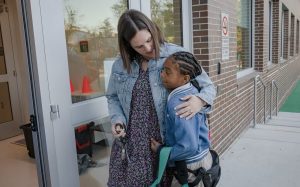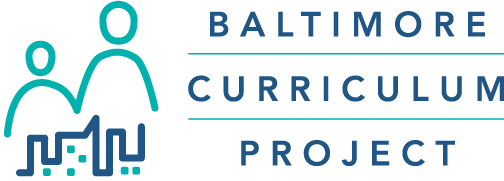 We know we can teach every child. However, we cannot teach a child who does not come to school. Yet, nationally and in Maryland, student attendance continues to be a challenge for schools, “a hidden educational crisis,” so dubbed by the U.S. Department of Education.
We know we can teach every child. However, we cannot teach a child who does not come to school. Yet, nationally and in Maryland, student attendance continues to be a challenge for schools, “a hidden educational crisis,” so dubbed by the U.S. Department of Education.
At the Baltimore Curriculum Project (BCP), school attendance is one of the most important metrics we track. Attending school every day, ready to learn, has never been more important as the country continues to address post-pandemic learning challenges.
This snapshot of national data on attendance underscores the educational challenges all schools face:
- An estimated one in six U.S. students are chronically absent (U.S. Department of Education).
- Early data by Attendance Works reveals that chronic absenteeism has doubled nationwide with 16 million students – one out of every three students – missing so many school days that they are at risk academically.
 Here in Maryland, the story is similar:
Here in Maryland, the story is similar:
- Maryland’s habitual truancy rate, defined as “unlawfully absent from school for more than eight days in a quarter or 20 days/school year,” jumped to 9.9% in 2020-21 from 2.8% the year prior, according to a January 2022 Maryland State Department of Education report on statewide enrollment and attendance trends.
- The same report revealed that attendance statewide (grades 1-12) was 92.5% in 2021, the lowest it had been in a decade, noting “student attendance rates are lagging significantly behind pre-pandemic levels,” and chronic absenteeism has increased since before the pandemic.”
The Ripple Effects of School Absenteeism
At BCP, we have known for decades that students need consistent instruction to develop and master basic skills in reading, writing, and math – and critical thinking and problem-solving. When students are absent from school, particularly our youngest learners and elementary-aged students, they fall behind on fundamental skills. This compounds as they move through other grades and simply may not catch up.
 Children with learning and neurological differences may not get needed interventions, especially in the earliest grades. If a student is not present in class, teachers cannot determine if interventions are needed. And if a student is not present to receive school-based interventions consistently, it’s harder to make progress.
Children with learning and neurological differences may not get needed interventions, especially in the earliest grades. If a student is not present in class, teachers cannot determine if interventions are needed. And if a student is not present to receive school-based interventions consistently, it’s harder to make progress.
Children’s social-emotional development suffers when they are not in a school environment and engaging with peers.
Chronic absenteeism also can lead to higher drop-out rates. Students not reading a grade level by the end of third grade are four times more likely than students who achieve proficiency to drop out of high school (source: The National Conference of State Legislatures, referencing a study by the Baltimore-based Annie E. Casey Foundation).
How BCP’s Community School Model Addresses School Attendance Holistically
Our community-school model creates solutions for families that help children be at school each day and ready to learn. Every one of our schools has a Community School Coordinator and other service providers who work to provide onsite health, mental health, and dental services to our schools. We have food banks, provide school supplies free of charge, uniforms and, in many situations, laundry services onsite.
Read more about Wolfe Street Academy’s (WSA) partnership with Johns Hopkins Hospital to address its community’s mental health needs onsite, a model found in other BCP schools as well.
 Creating a welcoming environment for families is also essential. A great example of this is WSA’s tradition of including parents in their morning meeting for greetings, announcements, and celebrations in English and Spanish. Afterschool programs that deepen what’s learned during the day and provide critical mentoring and enrichment activities (and snack and dinner) further BCP’s commitment to meeting student and family needs.
Creating a welcoming environment for families is also essential. A great example of this is WSA’s tradition of including parents in their morning meeting for greetings, announcements, and celebrations in English and Spanish. Afterschool programs that deepen what’s learned during the day and provide critical mentoring and enrichment activities (and snack and dinner) further BCP’s commitment to meeting student and family needs.
BCP’s full-time paraprofessionals and instructional coaches increase the number of adults in the classroom with our highly trained teachers. Each day, our students have many adults who know them, care for them, and are attentive to their ongoing needs to be present for learning and present at school.
BCP’s nearly three-decade use of the science-backed Direct Instruction also meets the best-practice learning protocols for curbing absenteeism. Students learn to read and write through a series of proven lessons with frequent assessments that guide small-group instruction placement. Small groups and carefully planned instruction and monitored progress allow BCP teachers to immediately respond to learning gaps and stumbles.
Early intervention and encouragement for attendance are essential. Our schools track attendance and celebrate good attendance to encourage students weekly. When we identify students at risk for high absentee rates, we reach out to the family early.
Tips for Parents to Improve Their Child’s School Attendance
 Parents can get off on the right foot for the new school year to improve attendance.
Parents can get off on the right foot for the new school year to improve attendance.
Set your child up for success by establishing clear weekly rituals for bedtime (no TV or video games 1 hour before is recommended) and morning. Lay out clothes and pack the backpack the night before. Creating a no-stress morning ritual helps children prepare for the day ahead.
Create a dedicated space to do schoolwork at home with school supplies and minimal distractions, if possible.
Talk about the importance of school with your child and talk about your expectations for attendance. Set attendance goals together.
If your child is missing school regularly, talk with the school and your child. Is it health-related? Possible bullying? A learning issue? Open communication is the first step to determine the cause and solution.






